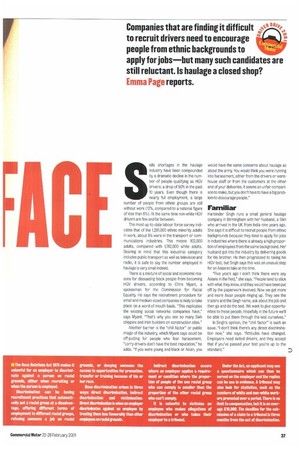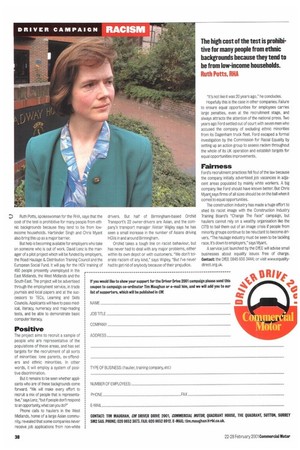Companies that are finding it difficult to recruit drivers need
Page 39

Page 40

If you've noticed an error in this article please click here to report it so we can fix it.
to encourage people from ethnic backgrounds to apply for jobs—but many such candidates are still reluctant. Is haulage a closed shop? Emma Page reports.
Skills shortages in the haulage industry have been compounded by a dramatic decline in the number of people qualifying as HGV drivers: a drop of 50% in the past 10 years. Even though there is nearly full employment, a large number of people from ethnic groups are still without work (12%, compared to a national figure of less than 6%). At the same time non-white HGV drivers are few and far between.
The most up-to-date labour force survey indicates that of the 1,281,000 ethnic minority adults in work, about 8% were in the transport or communications industries. This means 102,000 adults, compared with 1,742,000 white adults. Bearing in mind that this industrial category includes public transport as well as television and radio, it is safe to say the number employed in haulage is very small indeed.
There is a mixture of social and economic reasons for dissuading black people from becoming HGV drivers, according to Chris Myant, a spokesman for the Commission for Racial Equality. He says the recruitment procedure for small and medium-sized companies is likely to take place on a word-of-mouth basis. "This replicates the existing social networks companies have," says Myant. "That's why you see so many Sikh chippies and Irish builders on construction sites."
Another barrier is the "chill factor" or public image of the industry, which Myant says could be off-putting for people who fear harassment. "Lorry drivers don't have the best reputation," he adds. "If you were young and black or Asian, you would have the same concerns about haulage as about the army, You would think you were running into harassment, either from the drivers or warehouse staff or from the customers at the other end of your deliveries. It seems an unfair comparison to make, but you don't have to have a big problem to discourage people."
Familiar
Harbinder Singh runs a small general haulage company in Birmingham with her husband, a Sikh who arrived In the UK from India nine years ago. She says it is difficult to recruit people from ethnic backgrounds because they tend to apply for jobs in industries where there is already a high proportion of employees from the same background. Her husband got into the industry by delivering goods for his brother. He then progressed to taking his I-IGV test, but Singh says this was an unusual step for an Asian to take at the time.
"Five years ago I don't think there were any Asians in the field," she says. "People tend to stick with what they know, and they would have been put off by the paperwork involved. Now we get more and more Asian people ringing up. They see the trailers and the Singh name, ask about the job and then go and do the test. We want to give opportunities to these people. Hopefully in the future we'll be able to put them through the test ourselves."
In Singh's opinion, the "chill factor" is such an issue. "I don't think there's any direct discrimination now," she says. "Attitudes have changed. Employers need skilled drivers, and they accept that if you've passed your test you're up to the standard." Ruth Potts, spokeswoman for the RHA, says that the cost of the test is prohibitive for many people from ethnic backgrounds because they tend to be from lowincome households. Harbinder Singh and Chris Myant also bringthis up as a major barrier.
Positive
The project aims to recruit a sample of people who are representative of the populations of these areas, and has set targets for the recruitment of all sorts of minorities: lone parents, ex-offenders and ethnic minorities. In other words, it will employ a system of positive discrimination.
But it remains to be seen whether applicants who are of these backgrounds come forward. We will make every effort to recruit a mix of people that is representative," says Lenz, "but if people don't respond to an o pportunity, what can you doP" Phone calls to hauliers in the West Midlands, home of a large Asian community, revealed that some companies never receive job applications from non-white drivers. But half of Birmingham-based Orchid Transport's 22 owner-drivers are Asian, and the company's transport manager Alistair Wigley says he has seen a small increase in the number of Asians driving HGVs in and around Birmingham.
Orchid takes a tough line on racist behaviour, but has never had to deal with any major problems, either within its own depot or with customers. "We don't tolerate racism of any kind," says Wigley. "But I've never had to get rid of anybody because of their prejudice. "It's not like it was 20 years ago," he concludes.
Hopefully this is the case in other companies. Failure to ensure equal opportunities for employees carries large penalties, even at the recruitment stage, and always attracts the attention of the national press. Two years ago Ford settled out of court with seven men who accused the company of excluding ethnic minorities from its Dagenham truck fleet. Ford escaped a formal investigation by the Commission for Racial Equality by setting up an action group to assess racism throughout the whole of its UK operation and establish targets for equal opportunities improvements.
Fairness
Ford's recruitment practices fell foul of the law because the company initially advertised job vacancies in adjacent areas populated by mainly white workers. A big company like Ford should have known better. But Chris Myantoays firms of all sizes should be on the ball when it comes to equal opportunities.
The construction industry has made a huge effort to shed its racist image with the Construction Industry Training Board's "Change The Face" campaign, but hauliers cannot rely on a wealthy organisation like the CITB to bail them out of an image crisis if people from minority groups continue to be reluctant to become drivers. "The haulage industry must be seen to be tackling race. It's down to employers," says Myant.
A service just launched by the DIE will advise small businesses about equality issues free of charge. Contact: the DfEE 0845 600 3444; or visit www.equalitydirect.org.uk.




































































































